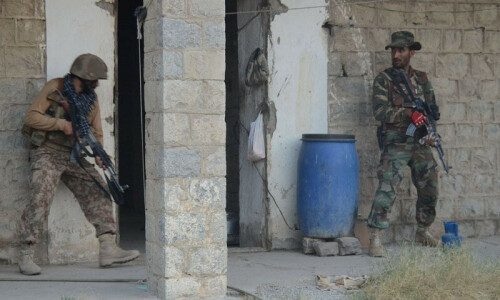
BAGHDAD: The Iraqi Federal Supreme Court on Tuesday terminated parliament speaker Mohammed Halbousi’s tenure, state media said, in a shock decision that upends the career of Iraq’s most powerful Sunni politician and sets the stage for a fight over succession.
In a video shared by his media office, Halbousi said the decision was “strange” and implied that it violated the constitution and undermined national stability, though he did not elaborate.
“We are surprised by the issuance of such decisions, we are surprised by their lack of respect for the constitution,” he said.
State media said the decision, which is final and not subject to appeal, was related to a Federal Supreme Court case brought against Halbousi earlier this year, without elaborating.
Halbousi terms decision ‘strange’, undermining national stability
Re-elected in 2022, Halbousi was serving his second term as speaker, a post he assumed in 2018 and which, under the sectarian power-sharing system established after the 2003 US invasion, is the highest office reserved for a Sunni.
Under the governing system in place since the post-Saddam Hussein constitution was adopted in 2005, the prime minister is a member of the Shia majority, the speaker is a Sunni and the largely ceremonial role of president is held by a Kurd.
This sectarian formula has often come under heavy strain as a result of competing agendas and has divided the spoils of massive oil wealth between powerful factions while failing to prevent bloodshed or provide people with even basic services.
Rapid rise
Mohammed Halbousi, a 42-year-old engineer from western Iraq who worked as a US contractor after the invasion, cultivated good relations and made deals with powerful Shia and Kurdish factions, who helped his rapid rise to power.
But more recently, he lost the backing of Iraq’s ruling Shia alliance, the Coordination Framework (CF), after he tried to form a government with their opponents following 2022 parliamentary polls.
Though he ultimately joined the CF in government, the damage was done and he was seen as untrustworthy, analysts say.
The CF were also uneasy with Halbousi’s ability to rally Sunnis who were historically divided since 2003 and present them as a unified front.
“The narrative around Halbousi is that he rose too quickly and made a lot of enemies in the process,” said Renad Mansour, director of the Iraq Initiative at London’s Chatham House think tank.
“Weakened opponents put the ruling Shia parties in a better position. They are in a better position when Sunnis or Kurds are divided and fighting internal disputes,” Mansour says. “He has been punished by the central government through legal mechanisms because of this.”
Critics say Iraq’s judicial system is widely subject to political influence, though top judges say it is an independent branch of government.
Published in Dawn, November 15th, 2023













































Dear visitor, the comments section is undergoing an overhaul and will return soon.